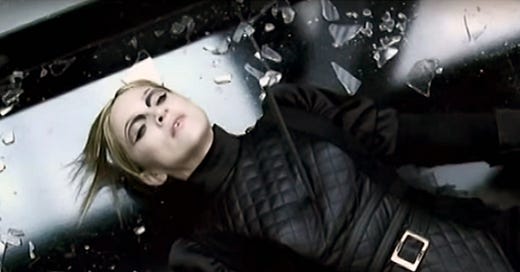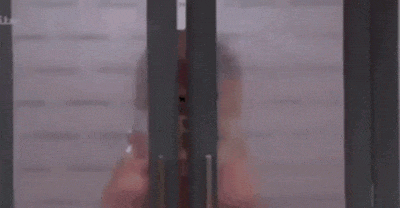The truth about everything* is different every week! This week, it’s the turn of THE MADONNA DIARIES, a series of personal essays about Madonna’s back catalogue.
Madonna has been catching pelters for most of her career – she’s the most inviting of all the tallest poppies. Whether exposing your sexual hangups in coffee table books or fellating water bottles, she’s always had an innate knack for getting polite society to wrinkle its nose in horror. Beyond a few pop-hating detractors and dreary sexists, the actual quality of her music was rarely called into question – she worked with the best producers, scored huge hits, and, post Ray of Light at least, had a respectable trophy cabinet. Yet in autumn 2002, everything changed, with the release of possibly the first Madonna track to attract near-universal derision – or maybe the second after Erotica. Yes, haters, Die Another Day has entered the chat.
The world might seem terminally depressing now, but in 2002 there was a dearth of optimism that seemed all the more shocking because of how (ostensibly at least) sunny things had been before it. The long hangover of the September 11 attacks, the ensuing war, and general political fatigue cast its shadow. Madonna was feeling introspective. Buoyed by the critical and commercial success of the Ray of Light and Music albums, Madonna was transforming from star to artist. Maybe she felt indestructible now she had the critics eating out of her hand. Perhaps she was eager to recreate the philanthropic high of her late ‘80s’/early ‘90s heyday, when she spoke out about gay rights, AIDS, and sexual positivity. Likely she thought at this stage in her career she could do whatever she wanted. Whatever her motives, she was looking for impact. She’s always had something to say – it was the motor of the first two decades of her career at least – but the themes she’d explored always complemented the more nakedly commercial machinery of her music. Hooks, beats, melodies, image. They were a partnership. Now, recording the American Life album, the message was the focus; the musical accompaniment starker, sometimes meek and shrinking into the background, and other times aggressive, overpowering, hostile. Die Another Day would, for better or worse, be our first taste of our new, angrier Madonna and I’m not entirely sure it ever recovered from the pressure.
Summer 2002, despite the immovable raincloud of topical events, was an exciting one for me. I was preparing to move to London (which I did, that October, the week the Die Another Day video was released). Madonna doing a Bond theme was big news; she was at her latest creative zenith and most people were pretty pumped for it, fascinated to see her approach. Balls-out traditional with full-on brass, strings, and drama? Haunting ballad à la Live to Tell? Or something else? With so much of what was to come unknown to us – how nostalgic I feel remembering being ignorant of the disastrous Swept Away movie – Madonna felt powerful and mysterious in a way she hadn’t since around the time of Evita and Ray of Light in 1996/7. Well, as mysterious as you can be when you’re photographed in the tabloids every day in your Mini Cooper or in Marylebone High Street Waitrose.
My first taste of Die Another Day came from a leaked loop of the intro, downloaded off Limewire or the other one whose name I can’t remember. No, not Napster, the other one. At that point, all we knew was the track was called Can’t You See My Mind (thanks to Heat magazine for getting that wrong). I played the file. It was mere seconds long, intriguing and different. Looming strings and echoing handclaps gave way to an almost jaunty melody that still felt very Bond before… the rulebook was not just torn in half but shredded, and a very Mirwais crunchy, stilted electronic beat kicked in, and suddenly we were listening to Music’s miserable goth cousin who made drinkable MDMA potions in the microwave. Then… nothing. The leaked track looped back to the start before any vocals began. Could this be a dupe? File sharing services were often flooded with fake MP3s to catch out impatient fans. It didn't sound like a Bond song. Could you have a dance beat on a Bond theme? Weren’t there rules? Anyway, as we now know, it was the real deal and out it came, months later, to a chorus of disapproval. I think it’s the last CD single I ever owned, bought for me by my then-boyfriend in the WH Smith in Waterloo station.
In a way, it was a mistake to ask Madonna to do a Bond theme. Not because Die Another Day is a bad song, because it isn’t; it’s more that two huge brands – or rather, egos – smooshed together in this way pulls focus from the product. The world has expectations of Madonna, and they have expectations of Bond, and in this case, both were managed quite badly. You get the feeling, with its heavily computerised vocals and stuttering delivery, the stark and hostile beats, all elbowing the more traditional sweeping strings out of the way, that Die Another Day is one more of Madonna’s career-long f•ck yous to convention. Another trolling exercise, in response to (legend has it) being told to incorporate a few more Bond-esque elements into her initial, well-received but ‘not quite there’ demo. It perhaps didn't help that Madonna is one of the biggest recyclers of her own work; Die Another Day was already hanging around in some form before the call came from 007, so a sense of occasion is maybe lost knowing it wasn’t specially composed for the (terrible) movie. As a fan, too, Die Another Day being a Bond theme killed my buzz for a new Madonna single. Firstly, I hated James Bond movies, as dated and embarrassing as bellbottoms in 1970s wedding photos. Secondly, the reaction was venomous; there were numerous accusations that Madonna had somehow ‘disrespected’ the tradition of Bond themes with a janky Eurodance love letter to outsmarting your therapist, and unfortunately these critiques coloured my own impressions of Die Another Day. I loved the idea, the sounds, the brash confidence of her performance, but the package as a whole, I found wanting. Who was this for? Who would hear the opening bars of this song and rush to the dance floor? Ironically, given the whole song is a statement of intent that Madonna will do as she damn well pleases and can survive anything, she seemed hobbled by the concept.
My first job in London was my dream job, a short tenure writing on a pop website, and I was tasked with reviewing the video. Madonna had never shied away from portraying violence in her imagery and music videos, but in recent years, she’d become more graphic – likely as a result of being married to posh mockney director Guy Ritchie at the time. Her previous video, for What It Feels Like a Girl, had annoyed censors with its gratuitous violence but, most of all, it felt like a creative misfire. Seeing Madonna double down in the Die Another Day video, at the time the second most-expensive ever made behind Michael and Janet Jackson’s Scream, was disappointing; I remember it leaving me cold. Watching Madonna be tortured is not, funnily enough, something most Madonna fans are keen to see. She’s waterboarded, electrocuted, beaten and – WORST OF ALL – made to wear a very filthy vest that no amount of Daz could save. Far more entertaining and fun are the scenes where Good Madonna and Evil Madonna do battle in a fencing match that turns more bloodthirsty as the song progresses. This being 2002, there are also the obligatory nods to Kabbalah and yoga, her obsessions with both already wearing quite thin; the Noughties were the best of times, and the worst of times to be a Madonna fan.
Lyrically, Die Another Day on first listen has ‘just scribbled these in a jotter on the way to pilates’ vibes, but is no poorer for it. Her invitation to ‘analyse this’ was prophetic, as the papers tried to work out what the hell she was on about, even though she literally tells them at the top of the stanza: ‘I’m going to destroy my ego’. Big words, and hugely misunderstood at the time. It seems obvious to me now that the whole song is a pep talk to herself, reassuring her that she can take on the most famous fictional man in movies, James Bond. That doing the Bond theme is a big deal, yes, and she may have to concede that she’s the second most-famous brand in the collaboration, yes, but that it won’t kill her. Analyse this, indeed. Only took me 21 years.
Thing is, she was right to be hesitant. Madonna became secondary in the whole experience. If you sweep aside the Bond stuff, ignore the video even maybe, and listen to the song in isolation, it’s still tangled in 007 lore. Yet as Bond themes go, it still sounds like the future and, paradoxically, an embodiment of the time it was released: uncertain, intense, reactionary, violent. And it still sounds good when turned up loud. In the pantheon of Madonna songs, it will never be a classic – in many ways it was a portent that the classics were about to become scarcer – but it is still, lest we forget, a Top 3 hit, a decent tune, and certainly not the worst Bond theme. Trouble is, even 007 wasn’t ready for her.
Some urgent questions before I close:
People talk a LOT about how Die Another Day doesn’t sound like a Bond theme. But… neither does the best one of all time either, really? (Carly Simon – Nobody Does it Better, she wasn’t lying, was she?) Do people basically mean ‘it’s not Goldfinger’?
How can Madonna be so good in the fencing scenes here and yet so… underwhelming in the cameo in the (terrible) movie itself?
Is it me or does Madonna blundering through the doors at the end of the video feel very reminiscent of this?
Say what you like about Die Another Day, but it got people talking. Plus, Madonna being Madonna, she is on record saying Die Another Day is one of her favourite songs. Of course it is. Analyse that.
I SECOND THAT PROMOTION
My Guardian Blind Date review blog, Impeccable Table Manners, is going on a wee break, but for the season finale we got two adorable guncles in Tim and Patrick. READ NOW









Loved reading this Justin - I didn't mind this as a single - exactly as you said, turn it up loud enough and it sounds good. But when singing along there's something that compels me to sing the pre-chorus hissy electronic/auto-tuney bit 'guess'I die another day' as 'it's Die Another Day' which would just be the worst, and has been keeping me amused for years. Hopefully I've ruined that for a few more people now but even explaining this has made me realise it isn't as funny as I thought it was. Anyway, you're spot on about what people mean about things 'not being Bond'. Great article.
Great analysis here. Insightful and informative...